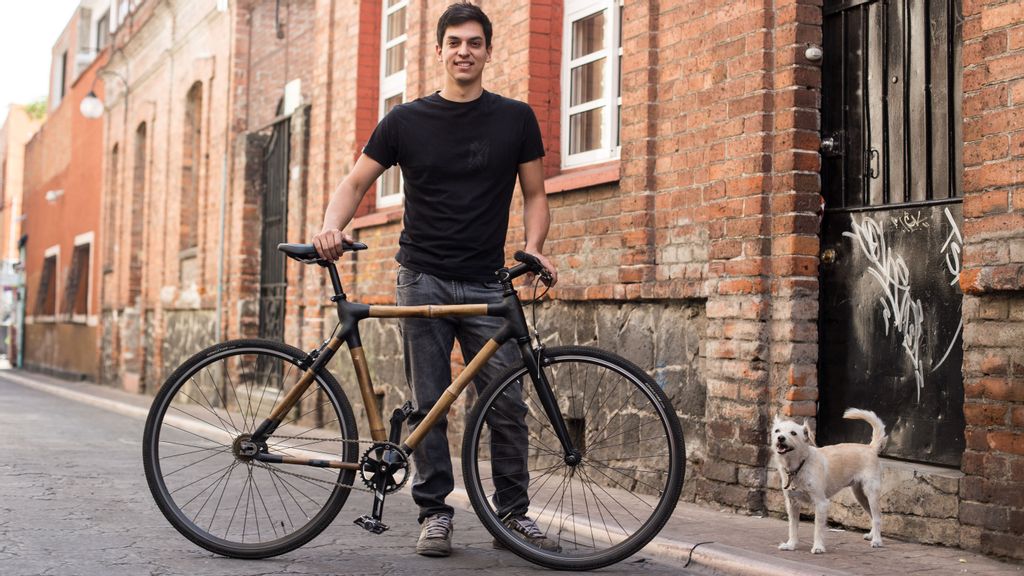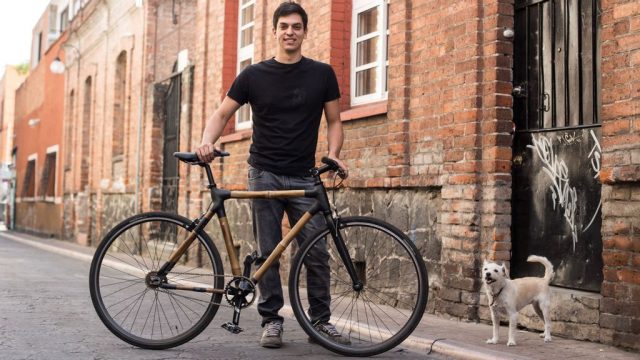
By Julio Guzmán
MEXICO CITY, Mexico — Mobility in Mexico City is complicated for citizens and authorities alike. The city is one of the five largest in the world, and the second-largest in the Americas, according to UN data.
One environmentally friendly option is Bamboocycles, Diego Cardenas’ company. It offers bicycles — made of 85 percent bamboo, a resistant, sugar cane-shaped root tropical plant.
Mexico’s National Institute of Statistics and Geography (INEGI) reports there were 6,149,969 vehicles registered in Mexico City in 2020, almost three times more than in 1980. Traffic has become unbearable in many parts of the city, especially during the week.

Cárdenas offers a cutting-edge solution. He says he has found high-quality bamboo that is resistant, long-lasting and environmentally friendly. It also absorbs vibrations.
“Bamboo does not suffer from fatigue. Fatigue is what happens to metal when you bend it over and over, like a piece of wire. Carbon fiber is an ultralight material, but if you hit it hard enough, it can crack. Bamboo is more resistant,” he told Zenger.
Cárdenas, an engineer graduated from the Universidad Nacional Autonoma de Mexico, started this project in December 2007. He made his first bicycle out of bamboo as part of a school project. He found a bicycle from 1890 made of bamboo and thought he could improve on the technology.
After working for three months on his first successful model, which captured people’s attention on the road, Cárdenas decided to specialize in producing bicycles in 2010. He gets the bamboo from southeastern Mexico and does not impact the environment.
“The bamboo plant produces 30 percent more oxygen than other trees. When you plant bamboo, you are actually pruning. You’re not killing a tree, like with other types of wood. In just three years, bamboo reaches maturity, unlike a pine or oak tree that takes some 15 to 40 years. I think that’s important,” he said.
Since launching Bamboocycles, he has sold 2,000 bikes and has exported to 28 countries. There are different models, with prices ranging from $195 for the “Bicinino,” a bike for children, to $1,890 for more specialized models, such as the “Loma,” for adults. The model that sells the best is the “Durango,” for $1,350.

People enjoy riding them.
“I have a bike that is light and is good for training in the mountains. I also use it to get around. Its geometry makes it very comfortable. It’s efficient and versatile. People really notice it; they ask if it’s a stick or guadua bike [a type of bamboo],” Laura Rojas, a Colombian living in Mexico City, told Zenger.
Bamboocycles also holds workshops in Mexico City. On the weekend, people can learn how to build their own bike, for $300. Through these types of activities, Cárdenas has been able to travel and offer his products in other countries, finding out what his clients need.
“We’ve found the business model. Hoping everybody wants the same thing doesn’t work for these types of products. A lot of clients are not great bike riders, and I guide them and find the way to adapt and give them what they’re looking for,” he said.

What started as a school project is now a thriving business. Cárdenas’ former classmates are happy about his success.
“I learned about his project in school. I thought it was a crazy idea,” Luis del Castillo, a former assistant of Cárdenas, told Zenger. “Then, I worked at Bamboocycles for two years, and I saw how Diego’s idea really had an impact. He proved that a sustainable, handcrafted product is not just a great idea, but also a profitable business.”
View this post on Instagram
The project began when Cárdenas got fed up with driving in the city. It took shape in a summer course in France on how to use bamboo. Today, he hopes to raise awareness and break stereotypes about car usage.
“The goal of Bamboocycles is to show that biking around the city is incredible. I hope more people realize it. This product saves time and money and brings you health and happiness,” he said.
Translated by Melanie Slone; edited by Melanie Slone and Fern Siegel
The post Bamboo Bicycles Provide Environmentally Sustainable Transport appeared first on Zenger News.




